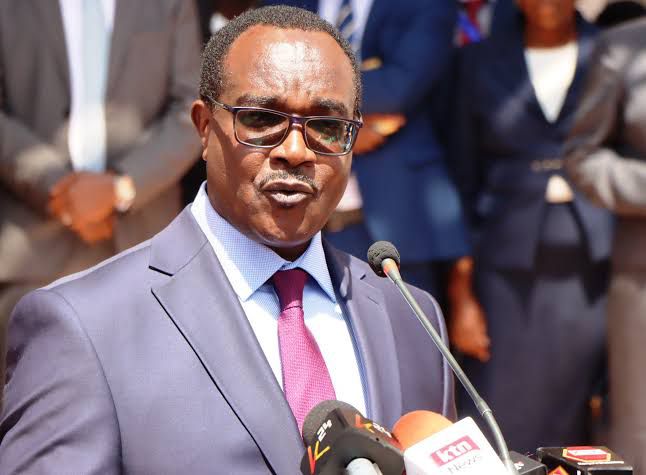𝐄𝐃𝐔𝐂𝐀𝐓𝐈𝐎𝐍 𝐒𝐄𝐂𝐓𝐎𝐑 𝐆𝐄𝐓𝐒 𝐋𝐈𝐎𝐍’𝐒 𝐒𝐇𝐀𝐑𝐄 𝐎𝐅 𝐊𝐒𝐇 𝟒.𝟐𝟑𝟗 𝐓𝐑𝐈𝐋𝐋𝐈𝐎𝐍 𝐁𝐔𝐃𝐆𝐄𝐓 𝐀𝐒 𝐓𝐑𝐄𝐀𝐒𝐔𝐑𝐘 𝐂𝐒 𝐔𝐍𝐕𝐄𝐈𝐋𝐒 𝟐𝟎𝟐𝟓/𝟐𝟎𝟐𝟔 𝐒𝐏𝐄𝐍𝐃𝐈𝐍𝐆 𝐏𝐋𝐀𝐍 𝐈𝐍 𝐏𝐀𝐑𝐋𝐈𝐀𝐌𝐄𝐍𝐓
The Cabinet Secretary for National Treasury and Economic Planning, Hon. John Mbadi, on Thursday June 12th, delivered his first official Budget Day speech before the National Assembly.
In a session that lasted slightly over two hours, CS Mbadi outlined the Budget Policy Highlights and Revenue Raising Measures for the Financial Year 2025/2026.
The Speaker of the National Assembly, Rt Hon. (Dr.) Moses Masika Wetang’ula, E.G.H,MP adjourned the House sitting at 5:23 p.m., shortly after the Cabinet Secretary concluded his presentation.
The proposed national budget for the 2025/2026 Financial Year stands at Ksh. 4.239 trillion and it is largely anchored on President William Ruto’s Bottom-Up Economic Transformation Agenda (BETA) and the broader goals of Vision 2030.
The gross expenditure is structured into three key categories: Ksh. 1.79 trillion for recurrent expenditure, Ksh. 1.337 trillion for Consolidated Fund Services (CFS), and Ksh. 707.8 billion for development expenditure.
In the budget unveiled by the CS, Education has been allocated the largest share of the 2025/2026 national budget, receiving Ksh 702.7 billion, which represents approximately 16.6% of the total budget of Ksh 4.239 trillion.
A significant portion of this allocation—Ksh 387.2 billion—has been earmarked for the Teachers Service Commission, which includes Ksh 7.2 billion dedicated to the recruitment of intern teachers.
Free Day Secondary Education will receive Ksh 51.9 billion, while Junior Secondary Capitation has been allocated Ksh 28.9 billion. The government will also spend Ksh 7.0 billion on Free Primary Education, Ksh 5.9 billion on national examinations, and Ksh 3.0 billion on the School Feeding Programme.
According to the CS, Infrastructural development in primary and secondary schools will receive Ksh 1.7 billion, with an additional Ksh 1.4 billion allocated to Technical and Vocational Education and Training (TVET) infrastructure. Higher education support has also been prioritized, with Ksh 41.5 billion going to the Higher Education Loans Board (HELB), Ksh 16.9 billion for university scholarships, and Ksh 7.7 billion for TVET capitation and scholarships.
The infrastructure sector has a total allocation of Ksh 217.3 billion. This includes Ksh 115.6 billion for road maintenance, Ksh 70.8 billion for rehabilitation, and Ksh 30.9 billion for road and bridge construction. An additional Ksh 38.0 billion has been allocated to railway development, while urban and ferry transport projects, such as the Nairobi Bus Rapid Transit system and Kenya Ferry Ramp, will receive Ksh 1.2 billion.
Health is also another highest funded sector with an allocation of Ksh 138.1 billion. This includes Ksh 42.4 billion for referral hospitals and Ksh 17.3 billion from the Global Fund to combat HIV, malaria, and tuberculosis. The government will also spend Ksh 13.1 billion on the Primary Healthcare Fund and Ksh 6.2 billion on coordinating Universal Health Coverage.
Other key allocations include Ksh 8.9 billion for Kenya Medical Training Centres, Ksh 8.0 billion for the Chronic and Critical Illness Fund, Ksh 4.6 billion for vaccines and immunization, Ksh 4.3 billion for medical interns, and Ksh 3.2 billion for Community Health Promoters. Vulnerable groups will receive medical cover worth Ksh 430 million.
Energy has been allocated Ksh 62.8 billion, with the bulk going to the National Grid System (Ksh 31.6 billion) and Rural Electrification (Ksh 16.3 billion). The Geothermal Development Programme will receive Ksh 11.5 billion, while Ksh 2.1 billion is set aside for alternative energy technologies. Nuclear energy development has been allocated Ksh 743.8 million.
The ICT sector has been allocated Ksh 12.7 billion. Key initiatives include Ksh 3.7 billion for the Kenya Digital Economy Acceleration Project, Ksh 3.1 billion for Konza Technopolis and Data Centre, and Ksh 2.3 billion for the Kenya Advanced Institute of Science and Technology.
Other allocations include Ksh 750 million for maintenance of the national fiber backbone, Ksh 700 million for the rollout of an e-Procurement system, Ksh 689 million for digital hubs, and Ksh 382 million for the Digital Superhighway initiative.
